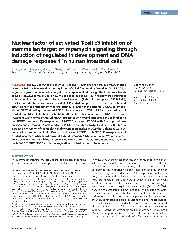摘要
The nuclear factor of activated T-cell (NFAT) proteins are a family of transcription factors (NFATc1-c4) involved in the regulation of cell differentiation. We identified REDD1, a negative regulator of mammalian target of rapamycin (mTOR) through the tuberous sclerosis complex (TSC1/2 complex), as a new molecular target of NFATc3. We show that treatment with a combination of phorbol 12-myristate 13-acetate (PMA) plus ionophore A23187 (Io), which induces NFAT activation, increased REDD1 mRNA and protein expression and inhibited mTOR signaling; pretreatment with the calcineurin inhibitor cyclosporin A (CsA), an antagonist of NFAT signaling, decreased REDD1 induction and mTOR inhibition. Knockdown of NFATc3, not NFATc1, NFATc2, or NFATc4, attenuated PMA/Io-induced REDD1 expression. Treatment with PMA/Io increased REDD1 promoter activity and increased NFATc3 binding to the REDD1 promoter. Overexpression of NFATc3 increased REDD1 mRNA and protein expression and increased PMA/Io-mediated REDD1 promoter activity. Treatment with PMA/Io increased expression of the goblet cell differentiation marker MUC2; these changes were attenuated by pretreatment with CsA or knockdown of REDD1 or NFATc3. Overexpression of NFATc3 increased, while knockdown of TSC2 decreased, MUC2 expression. We provide evidence showing NFATc3 inhibits mTOR via induction of REDD1. Our results suggest a role for the NFATc3/REDD1/TSC2 axis in the regulation of intestinal cell differentiation.
- 出版日期2012-8-1
